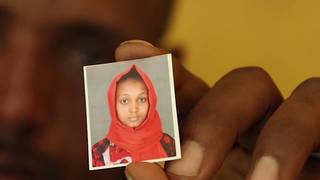
Related
Guests
- Vaward-winning playwright and creator of The Vagina Monologues and V-Day, a global movement to stop violence against women and girls. Her latest book is called I Am an Emotional Creature: The Secret Life of Girls Around the World.
Links
Eve Ensler has made it her lifelong mission to end violence against women and girls. The founder of V-Day and the bestselling author and playwright behind The Vagina Monologues, her latest book is a collection of fictional monologues and stories inspired by girls. It’s called I Am an Emotional Creature: The Secret Life of Girls Around the World. [includes rush transcript]
Transcript
AMY GOODMAN: Earlier this year, the Justice
Department designated the month of February as the National Teen Dating Violence Awareness and Prevention Month. Vice President Biden commended the development, emphasizing, quote, “Teen dating violence is all too common, and ends up leading to vicious and unhealthy cycles for years to come. Our responsibility — as parents, teachers, mentors, and community leaders — is to guide our young people towards respectful relationships free from harassment and abuse; teach them that it’s OK to walk away from a bad situation; and encourage them to speak out when they see a friend in trouble.” Those, the words of Joseph Biden.
Meanwhile, on Capitol Hill this week, Senate Majority Leader Harry Reid linked rising unemployment to increased violence against women and girls.
SEN. HARRY REID: I met with some people while I was home dealing with domestic abuse. It has gotten out of hand. Why? Men don’t have jobs. Women don’t have jobs either, but women aren’t abusive, most of the time. Men, when they’re out of work, tend to come — become abusive. Our domestic crisis shelters in Nevada are jammed. It’s the way it is all over the country.
AMY GOODMAN: Domestic violence came up again during Thursday’s healthcare summit in an intervention by New York Congress member Louise Slaughter.
REP. LOUISE SLAUGHTER: Pre-existing conditions absolutely has to go. It is cruel. It is capricious. And it is done only to enhance the bottom line. Eight states in this country right now have declared that domestic violence is a pre-existing condition, on the grounds, I assume, that if you’ve been unlucky enough to get yourself beaten up once, you might go around and do it again.
AMY GOODMAN: Well, I’m joined here in our New York studio by someone who’s made it her lifelong mission to end violence against women and girls. Eve Ensler is the founder of V-Day, the bestselling author and playwright behind The Vagina Monologues. Her latest book is a collection of fictional monologues and stories inspired by girls. It’s called I Am an Emotional Creature: The Secret Life of Girls Around the World.
We welcome you to Democracy Now!
EVE ENSLER: Thanks. Happy to be here.
AMY GOODMAN: Congratulations. Also, thank you for coming in on this very snowy day in New York. But why did you choose “the secret life of girls around the world” as your topic?
EVE ENSLER: Well, I, you know, have had the great fortune, as you know, over the last twelve years to travel around the world with V-Day. And often I go to places, kind of the — sort of like the rape mines of the world. I live in really difficult situations, where women are being violated, are being raped, are being mutilated. And in the last twelve years, I’ve met so many girls facing so many obstacles, and I’ve heard so many interesting stories and experiences that I don’t see reported in a lot of places, particularly when people are talking about what the world is really like for girls. And so, I just started to put stories together and to just investigate and write down things I was hearing, as I was going, and imagine things that might — I might be hearing, if there were another world.
And over the last five years of writing this book, this theme began to emerge, which is that it didn’t really matter what country I was in. There seems to be this global mandate, a familiar mandate, a societal, a religious mandate, for girls to please somebody, you know, in some form or another. And it ranges from, you know, the upper-class suburbs, where girls feel they are nobody if they don’t have the new pair of purple UGGs; to girls in other kind of situations in suburbs starving themselves to look a certain way; to girls in Kenya who are forced into traditions to have their clitoris removed; to girls in Israel who were saying, if you don’t join the army, you’re not part of this culture. And it goes on and on and on.
And I started to really see that this verb “to please” seems to be the single verb that girls are kind of enforced with and that 74 percent of the girls interviewed in this one survey said they felt compelled to please everyone all the time. So I just started thinking, what if we changed the verb? What if the verb were to challenge or to protest or to organize or to create or to dare or to do anything but please?
And even the statistics you were talking about earlier, why are so many girls — I think it’s one out of five girls in this country will find themselves in a relationship where they are hit, slapped or punched. Why? One out of five girls in the year 2010 — why? And so much of that is about pleasing and being afraid that if you don’t go along with a situation, you won’t have a boyfriend, you’ll be left alone, so you end up giving up your own integrity, your own authentic voice and your own values, to please somebody else.
AMY GOODMAN: So tell us about the specific stories you chose, like the Chinese girl making Barbie dolls.
EVE ENSLER: Well, I’ve been obsessed with Barbie for a long time, and — because I just — you know, all these things that I’ve learned about Barbie, too, that she was actually modeled on a sex toy named Lilli, and that’s how it came to be. So you just think about that, that this toy that has now — they’ve sold one billion Barbies on the planet. A Barbie gets sold every three seconds. So, this is a sex toy that’s being marketed to girls all around world as an ideology or as an image or an idea of who they’re supposed to be.
And I started just doing research about who makes Barbie and who spends — and the conditions in the factories in Asia where girls are who make Barbie. And I just imagined this girl who was making Barbie’s head all day, and what was it like as an Asian girl in a factory who’s getting basically slave wages, maybe a little bit higher than slave wages. What is her life like, as she sits and makes Barbies for people in the West, who can fill their dream houses with Barbies as she is sitting there in a sweaty factory getting cut all day on machines?
And the piece is really about her profound imagination and how she head-sends her thoughts into each Barbie she makes, and she sends her message around the world, which is really about freeing Barbie and having Barbie go from makeover to takeover and releasing the one million Barbies on the planet, who she believes are really kind of undercover geniuses, who, if we allowed them, would rise up and take over.
But I also think that the story of Barbie and the making of Barbie is kind of the story of the world, that we have a girl, starving in a factory in China, producing a doll that ends up, you know, coming to the West and encouraging girls to starve themselves here so they can look like her. So it’s this kind of, you know, evolution of starvation, on one form or another, for girls and about girls. And I think it’s a way of linking the worlds, too, so we see how the kind of exploitation of child labor ends up exploiting girls on a whole other level once it comes here.
AMY GOODMAN: Speaking of starving themselves, you have this girl blogging, and the more she blogs, the less she eats.
EVE ENSLER: Yes. Well, you know, when I did The Good Body, I spent a lot of time listening to girls about eating disorders, and I spent time in eating disorder clinics. And I’m overwhelmed to see the kind of rise in eating disorders right now, in not only this country, but all over the world, because as we export our TV shows and our images, you know, it’s proven that after certain TV shows come into a certain country, within a year, the eating disorders rise.
And I think this notion that girls will only be happy when they’re the size of a pencil, you know, based on eating a raisin a day, what is the real ideology behind that, you know, girls starving themselves? Well, it’s about disappearing. It’s if you become less and less and less, you actually won’t be here eventually. You won’t take up space. You won’t have power. You can’t think very well when you don’t eat. It turns out we actually need food for thoughts, and to have expansive thoughts or deep thoughts, you actually have to put nutrients in your body.
And I think part of what I’ve been looking at in this country is seeing this kind of compulsion, this cellular compulsion, that’s kind of mainlined into girls, from the time they’re born, to look a certain way. And usually that way is — I always joke about it, but there’s probably five women in Iceland who look the way 99 percent of the planet doesn’t look, but is trying to look. You know? Most people on the planet are people of color. They’re round. They’re very specific. But everybody is being compelled to look skinny, white, blond.
And again, it becomes an occupation. It takes up a lot of time. You become distracted. You don’t focus on changing the healthcare system. You don’t focus on saving people’s lives. You don’t focus on reaching out. You focus on your body. It’s a very narcissistic occupation.
AMY GOODMAN: And the Bulgarian sex slave who’s fifteen years old?
EVE ENSLER: That was based on a true story. I was in Bulgaria for a V-Day, where I was asked to come because of the sex trafficking that was going on there. And when I arrived, I was rushed to this meeting with a girl who only had thirty-five minutes before her pimp came looking for her. And although the monologue, I — you know, obviously it’s a fictional piece. It was a very, very disturbing interview, which I’ll never forget, of a fifteen-year-old girl who had cigarette burns all over her body, because her body was like an ashtray. And she had herpes, and she was just a mess and literally had been sold, you know, onto the streets. She couldn’t get out. Her parents would be killed if she spoke up. And she was so panicked in that thirty-five minutes, because she was sure any second that her pimp would arrive and kill her. And the group that I was with was trying to get her off the streets and trying to help her, but were really torn between protecting her at the exact right moment where to transition her would not impact her staying alive.
AMY GOODMAN: Congo is an issue you take on beyond this book. I mean, this is one of the issues of your life, the Democratic Republic of Congo. How do you think things have changed there, or have they at all, the level of rape?
EVE ENSLER: Well, I was just on the phone earlier this morning with Dr. Mukwege, and there were —-
AMY GOODMAN: Of the Panzi Hospital?
EVE ENSLER: Of the Panzi Hospital in Bukavu. And -—
AMY GOODMAN: And explain. This is where?
EVE ENSLER: Yeah, Dr. Mukwege runs a hospital in Panzi — Panzi Hospital in Bukavu, where, at any given time, there are 300 women who have been raped or who have fistula from horrible genital destruction and violations and tortures. And I’ve been to the Panzi Hospital now probably five trips over the last three years.
The story of the Congo is a really interesting story and painful story. On one hand, he’s — I spoke to him this morning, and he had just been through two massacres this week, where five women had been taken and murdered, and then yesterday the same thing. And he was seeing women come to the hospital, and he was devastated, to be honest. He just sounds tired, really tired.
So we had that going on, where the war continues. And I have no idea where the international community is, on some deep level. There had been promises made by this government, the British government, the French government, the Canadian government, the European Parliament. I’ve been to all these places. We have this Obama administration; I don’t know what exactly is happening. Hillary —- Secretary Clinton made a trip there and made promises, and we were all kind of galvanized by that. Still waiting for those promises to be fulfilled.
AMY GOODMAN: And the promises are?
EVE ENSLER: Well, there was $17 million promised, and I think some of that money has gotten there. But what was indicated was a will to change things, and we have seen the ongoing conflict.
On the other hand, there is a rising women’s movement and a rising movement happening in the Congo that I’m very proud to be part of. And we are seeing women really beginning to take back their destinies and take back their voices and break the silence, and marches.
And we’re opening a huge, huge wonderful place on May 25th, which I hope you’ll come to, which is going to be a place for a hundred survivors, at any given time, to be trained, to be healed, to be supported, to be economically empowered, so that they can become the next leaders of the DRC. And I -—
AMY GOODMAN: And where is this?
EVE ENSLER: It’s in Bukavu. It’s right near Panzi Hospital. It’s absolutely magnificent. I was there the month of December. And out of 160 workers, sixty women are building. And when we got there, they had buckets of ninety pounds of cement on their head, and they were dancing through the fields, you know, singing, because it’s their city of joy.
So I’m very optimistic at the same time as I’m horrified about the ongoing war. And where we need to put pressure is on this government and on the people who have power and are stakeholders there to put pressure on the Rwandese, on the Ugandans, on the Burundis, to stop fighting their wars in the Congo and to stop fighting their wars on the bodies of Congolese women.
AMY GOODMAN: Eve, the last time I talked to you, you were here in New York in this studio, and we were in Port-au-Prince. We had just visited — or learned of the death of your friend, the Haitian feminist leader Myriam Merlet. She died under the rubble of her home in Port-au-Prince after the earthquake. We went to the site of her home, and we talked to you about that when we were down there. When we went to her house, her body had just been pulled out of the rubble by her sister. Her sister was there. Her name was Ertha Lafalaise. And she was buried just down the road. And I wanted to end this part of the discussion with you by bringing you Ertha, who talked about her sister Myriam.
ERTHA LAFALAISE: [translated] She was always there for women. She wrote articles. She went around the world. She was a woman on the ground. She worked for almost half of her life changing the situation of Haitian women. Particularly now, she was standing up, looking for aid, looking everywhere. That was Myriam.
AMY GOODMAN: And that was Ertha Lafalaise, who was sitting right by her sister’s grave. The coffin was not even buried yet. It was just laid in the ground down the road. Talking about Myriam Merlet, a leading feminist in Haiti. Eve Ensler?
EVE ENSLER: Well, first of all, I’m so grateful that you did that. And it was just — a woman was talking to me about it, how amazing it was that you went there and found her. I was at Myriam’s memorial in Montreal a few weeks ago, and we have decided in V-Day that we’re going to make Haiti the spotlight next year. And I’m on my way to Haiti in a couple of weeks to meet with all the women’s groups in Myriam’s name to see how we can really serve the women of Haiti next year and do a very big, big support of women’s groups in Myriam’s name. So I thank you, and a lot of people were so grateful that you found her.
AMY GOODMAN: I wanted to end with the title, I Am an Emotional Creature, I think something that Myriam Merlet would appreciate, and this one girl fact you begin with. Your left lung is smaller than your right lung to make room for your heart. That’s how you begin the book.
EVE ENSLER: Yeah. Yeah, well, I think Myriam certainly taught us about the heart and about empathy and about connecting to other people through compassion. And I think we need much more of that on the planet right now, if we’re going to find a way through all this.
AMY GOODMAN: Eve Ensler’s new book is called I Am an Emotional Creature: The Secret Life of Girls Around the World. Eve, thanks for joining us.













Media Options